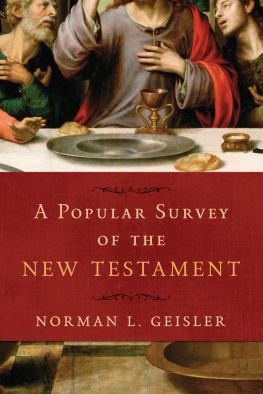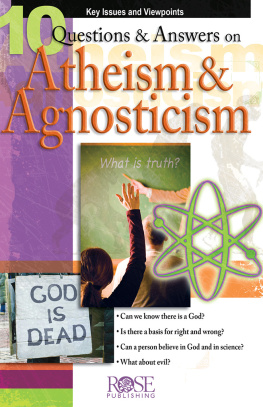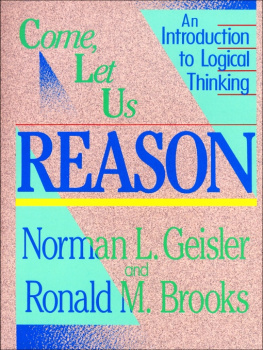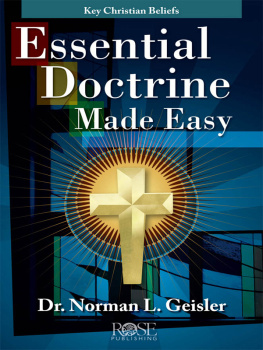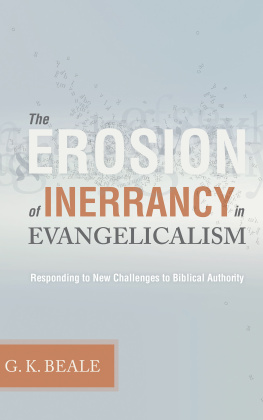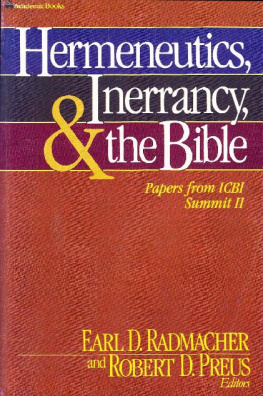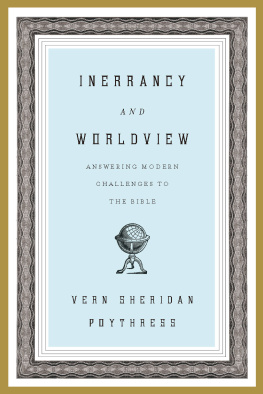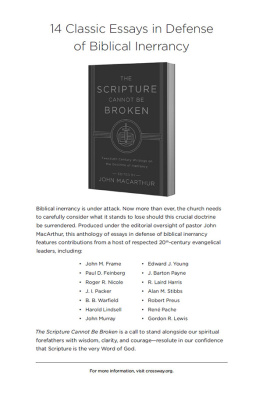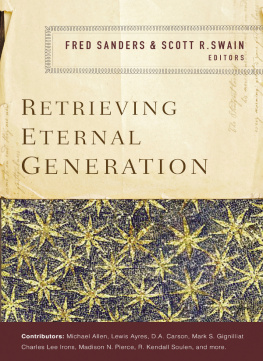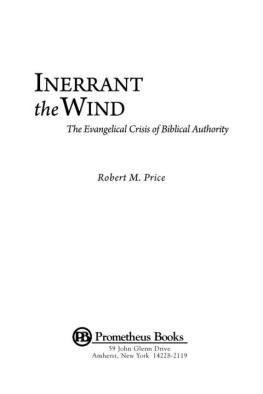
2011 by Norman L. Geisler and William C. Roach
Published by Baker Books
a division of Baker Publishing Group
P.O. Box 6287, Grand Rapids, MI 49516-6287
www.bakerbooks.com
Ebook edition created 2011
All rights reserved. No part of this publication may be reproduced, stored in a retrieval system, or transmitted in any form or by any meansfor example, electronic, photocopy, recordingwithout the prior written permission of the publisher. The only exceptions are brief quotations in printed reviews.
ISBN 978-1-4412-3591-6
Library of Congress Cataloging-in-Publication Data is on file at the Library of Congress, Washington, DC.
Unless otherwise indicated, Scripture quotations are from The Holy Bible, English Standard Version (ESV), copyright 2001 by Crossway, a publishing ministry of Good News Publishers. Used by permission. All rights reserved. ESV Text Edition: 2007
Scripture quotations labeled KJV are from the King James Version of the Bible.
Scripture quotations labeled NASB are from the New American Standard Bible, copyright 1960, 1962, 1963, 1968, 1971, 1972, 1973, 1975, 1977, 1995 by The Lockman Foundation. Used by permission. www.lockman.org
Scripture quotations labeled NIV are from the Holy Bible, New International Version. NIV. Copyright 1973, 1978, 1984, by Biblica, Inc. Used by permission of Zondervan. All rights reserved worldwide. www.zondervan.com
Scripture quotations labeled NKJV are from the New King James Version. Copyright 1982 by Thomas Nelson, Inc. Used by permission. All rights reserved.
Scripture quotations labeled RSV are from the Revised Standard Version of the Bible, copyright 1952 [2nd edition, 1971] by the Division of Christian Education of the National Council of the Churches of Christ in the United States of America. Used by permission. All rights reserved.
Italics in Scripture quotations reflect the authors emphasis.
The internet addresses, email addresses, and phone numbers in this book are accurate at the time of publication. They are provided as a resource. Baker Publishing Group does not endorse them or vouch for their content or permanence.
Well, here we go again. In yet another generation, the inerrancy of the Bible is being called into question. This time the issues are often more subtle, but they represent a clear and present challenge for those who would defend and affirm the perfection of the Holy Scriptures. Defending Inerrancy is a much-needed work and one that will start an important and timely conversation. This is a book that cannot, must not, and will not be ignored. R. Albert Mohler Jr., president, The Southern Baptist Theological Seminary
In the following pages Norman Geisler, who contributed as much as anyone to International Council on Biblical Inerrancys [ICBI] original legacy, and William Roach interact with evangelical hypotheses that have the effect of confusing that legacy. They are masterly gatekeepers, and I count it an honor to commend this work to the Christian world. J. I . Packer, from the foreword
Even in the days of the ICBI, Norm Geisler knew that every generation would have to address the question of the faithfulness of Gods Word. After all, the earliest attack of Satan was on the question of whether or not God had really said what our first parents understood him to say. In this superb volume, Geisler and Roach have demonstrated once again that the attack, though an old one, must and can be answered. Anyone engaging the culture needs to read this book. Paige Patterson, president, Southwestern Baptist Theological Seminary
The biblical doctrine of inerrancy is both true and of crucial importance for the life and health of the church. Geisler and Roach provide an excellent, up-to-date treatment of the recent history of the doctrine, an analysis of what it does and does not mean, and a response to recent attacks against it. I am glad to see this book come out and happy to recommend it. J. P. Moreland, Distinguished Professor of Philosophy, Talbot School of Theology; author, The God Questio n
Norm Geisler and I both served on the ICBI for the ten years of its existence. What Dr. Geisler has now written in his new book is certainly a masterpiece and worthy of careful attention by all who are interested in dealing with the inerrancy of the Word of God. Earl D. Radmacher, president emeritus, Western Seminary, Portland, Oregon
This volume is a call to consider the trustworthiness of Scripture. It is written by one of framers of the seminal Chicago Statement on Biblical Inerrancy, 1978. I maintain that everyone interested in spreading the message of the Bible should read and absorb Geislers treatment of this subject. It will strengthen your conviction that Gods Word is truth and that it will stand forever. Phil Roberts, president, Midwest Baptist Theological Seminary, Kansas City, Missouri
This book begins with a tremendously helpful history of the battle for the Bible, the controversy that dominated the evangelical landscape some thirty-five years ago. The authors recount the powerful defense of biblical accuracy and authority that was led by the International Council on Biblical Inerrancy in the 1970s and 1980s. Then they give a very informative but deeply disturbing digest of several recent attacks on Scripture that have come from supposedly evangelical authors and institutions just in the past decade.
The very same issues are under debate as before, and all the same tired, already-answered arguments have been hauled out once more against Scripture. It is time for genuine believers to awaken to this issue again and speak up with a clear, united voice of confidence and conviction. We owe a debt to Norm Geisler and Bill Roach for their willingness to stand at the front line in this renewed battle for the Bible. John MacArthur, pastor, Grace Community Church, Sun Valley, CA; president, The Masters College and Seminary
Church history records many a battle for the Bible. So it is not surprising that in our day, the debate about inerrancy rages. Norman Geisler and William Roach provide an excellent history of the debate and bring the battle up to date with recent challenges to inerrancy. Their book is an essential manual to understand the debate and to defend biblical inerrancy. Kerby Anderson, national director, Probe Ministries; host, Point of View
This is one of the most important books of the decade. Geisler and Roach not only answer contemporary challenges to inerrancy but also provide a theological, apologetical, and philosophical analysis and defense of inerrancy that is rather stunning in its breadth and detail. Theology students both young and old will benefit immensely from this well-researched, well-written volume. Ron Rhodes, president, Reasoning from the Scriptures Ministries
We wish to thank Joel Paulus for the many hours he spent improving the manuscript of this book. For his diligent and scholarly efforts we are very grateful. He greatly improved the final text.
Contents
Foreword
The two decades between the twentieth centurys world wars were years of eclipse for English-speaking evangelicals on both sides of the Atlantic. Liberalism was in the saddle in the major Protestant churches, and liberalism remained as John Henry Newman had defined it:
Liberalism in religion is the doctrine that there is no positive truth in religion, but that one creed is as good as another.... It is inconsistent with any recognition of any religion as true. It teaches that all are to be tolerated, for all are matters of opinion.
The virile Reformational orthodoxy of earlier days had been elbowed out to the sidelines, and what we nowadays refer to as the guildthat is, the theological teaching community in universities, colleges, and seminariesseemed finally to have closed its ranks against conservative scholarship and conservative scholars. Licking its wounds, evangelicalism had withdrawn into modes of premillennialism, mainly dispensational, on the one hand and pietism, mainly of the Keswick type, on the other. In North America, the biggest of these recessive groupings took the name fundamentalism, on the ground of its strict adherence to the fundamentals of biblical faith.




